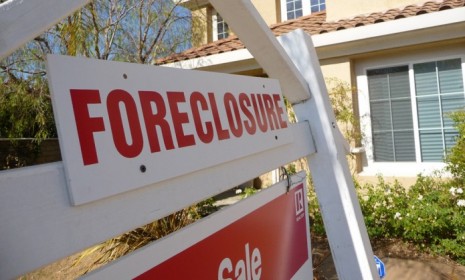America's foreclosure crisis: What it means for your mortgage
Bank of America has frozen foreclosures, sparking calls for a nationwide ban on repossessions. Is that move likely, and how would it affect the average homeowner?

Bank of America announced last week it would freeze foreclosures in all 50 states, as concerns mounted over the legal basis for home repossessions. JP Morgan Chase and Ally Financial also halted foreclosures in 23 states, and other banks are considering following suit. Some congressional Democrats want a nationwide freeze on repossessions — a move the White House opposes. (Watch a Fox News report about the foreclosure crackdown.) Here's an instant guide to America's mortgage mess:
Why has Bank of America frozen foreclosures?
Simply put, because the bank is increasingly unable to prove it owns the mortgages it is foreclosing upon. People whose houses have been repossessed can ask the bank to produce proof it owns the mortgage in the form of a physical mortgage note. If the bank can't produce the note, the repossession can be ruled invalid.
The Week
Escape your echo chamber. Get the facts behind the news, plus analysis from multiple perspectives.

Sign up for The Week's Free Newsletters
From our morning news briefing to a weekly Good News Newsletter, get the best of The Week delivered directly to your inbox.
From our morning news briefing to a weekly Good News Newsletter, get the best of The Week delivered directly to your inbox.
Surely the bank will have the correct documentation for each mortgage?
Not necessarily. During the housing boom, many mortgages were packaged up by Wall Street banks as bonds and sold off to investors. These sales were so splintered and complex that it didn't make sense to involve paper documents every time the title switched hands. Instead, the physical mortgage note produced by the original lender would typically be sent to a repository.
Can't the bank just fetch the notes from the repository?
Sometimes they can. But the documents can be very difficult to track down. At the height of the boom, lenders were giving out mortgages without much in the way of documentation, and they were often securitized before a physical note could be sent out. In addition, many of these lenders have since collapsed or been bought out by a larger bank. This "fast and loose and slightly documented culture," says John Carney at CNBC, means that tracking down the notes in all cases is "difficult, if not impossible."
A free daily email with the biggest news stories of the day – and the best features from TheWeek.com
Is this a new development?
No — lawyers have been contesting repossessions on so-called "show me the note" arguments since the housing bubble burst. It doesn't always work. In many states, banks can convince a court that a note existed even if they can't produce the actual paperwork. Most homeowners used the argument to buy themselves some time rather than keep hold of their homes. What has the banks scared is fresh evidence that hundreds of thousands of foreclosures were approved by loan officers without any kind of scrutiny at all. This could open them up to countless lawsuits from former owners. Hence the freeze on repossessions.
Why would a nationwide freeze on foreclosures be bad for the economy?
Because sales of foreclosed houses make up a large percentage of all homes sold in the United States. Almost one in four (24 percent) of all home transactions from April to June this year were foreclosure sales. In states hit hard by the housing crisis, the percentage was higher — 56 percent in Nevada, for example. A nationwide freeze would cut off the supply of foreclosed houses and a large source of revenue for banks and mortgage-lenders.
If such a freeze ever came into effect, what would it mean for my home?
The temporary lack of supply to the market could mean a short term bump in the price of your house. But don't get too excited — a freeze would not be permanent. Once the banks determine a firm legal basis for repossessions, the market could be hit by a glut of foreclosed homes, likely causing house prices to fall.
How worried should we be?
There's definitely cause for concern. But the a freeze isn't the big risk here, says Felix Salmon at Reuters — it's these "badly-documented mortgages." Until we have a market in which "title and ownership are clear and legally watertight," there will be no confidence in it. For that reason, investors and banks must come together, "bite the bullet and fix the mortgage mess." If that doesn't happen, or if it proves to be an especially difficult and lengthy process, says CNBC's Carney, bank lending and real estate transactions could start freezing up. "In short, this could be the beginning of the second leg of the credit crunch."
Sources: CNBC, Bloomberg, The New York Times, Reuters, Huffington Post
-
 How the ‘British FBI’ will work
How the ‘British FBI’ will workThe Explainer New National Police Service to focus on fighting terrorism, fraud and organised crime, freeing up local forces to tackle everyday offences
-
 The best family hotels in Europe
The best family hotels in EuropeThe Week Recommends Top kid-friendly hotels with clubs, crèches and fun activities for children of all ages – and some downtime for the grown-ups
-
 Moon dust has earthly elements thanks to a magnetic bridge
Moon dust has earthly elements thanks to a magnetic bridgeUnder the radar The substances could help supply a lunar base